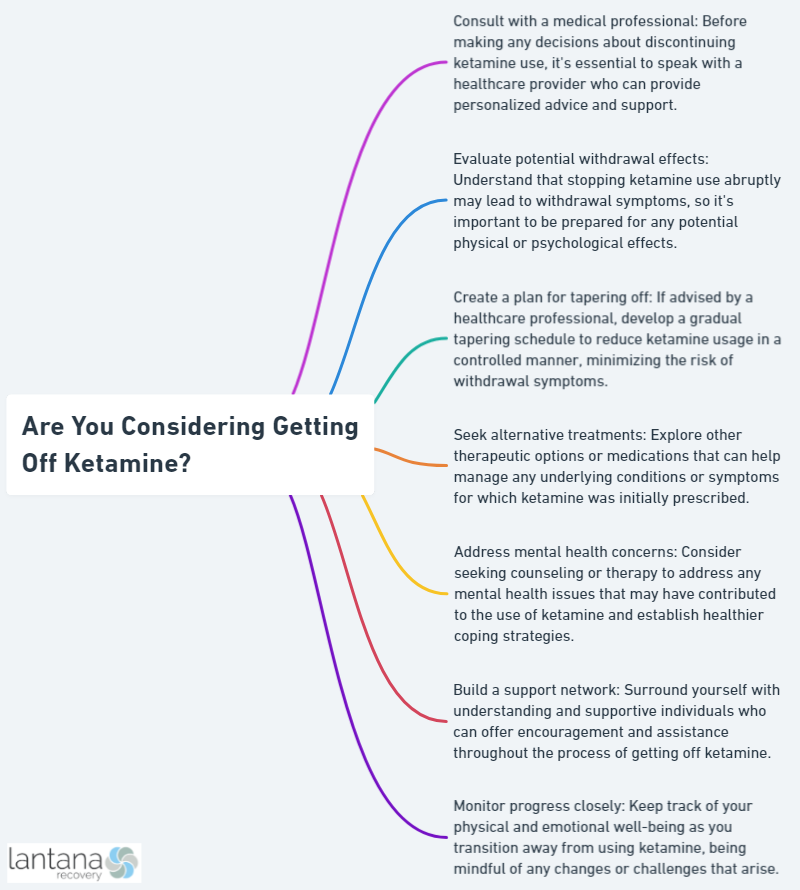Ketamine can be an effective form of treatment for those suffering from mental health issues such as depression and anxiety, but what do you do when it’s time to stop using the drug? Tapering off ketamine is a slow and steady process that takes patience and dedication.
In this blog post, we will go over the steps involved in coming off ketamine and provide support throughout your journey toward being medication-free. With understanding and intentional planning, you can successfully transition away from ketamine while minimizing potential side effects.
Read on to learn more about getting off Ketamine safely!
What is Ketamine?
Ketamine is an anesthetic drug that operates differently than other anesthetics due to its dissociative properties. It can be used as a sedative prior to surgery and has pain-relieving qualities in small doses, which is why it is sometimes used for procedures such as biopsies or minor surgeries.
Though originally designed to serve as an anesthetic, its therapeutic potential has been examined increasingly in the last decade, leading to its recognition as a promising treatment option for several mental health issues such as major depression and PTSD.
Beyond its clinical uses, Ketamine has gained attention over the years for its recreational use due largely to its ability to induce intense psychedelic experiences.
How to quit using Ketamine safely?
Quitting Ketamine cold turkey can be a daunting process, especially for those who have become deeply dependent on the drug. When done correctly, however, the process of coming off the drug can be made much easier and safer.
Quitting Ketamine Cold Turkey
Quitting Ketamine cold turkey is generally discouraged, as it can cause strong physical and mental withdrawal symptoms. Since the effects of the drug last for a few hours before gradually wearing off, suddenly stopping usage can have drastic impacts on the individual.
Going cold turkey can cause very uncomfortable physical and mental symptoms and lead to seizures, panic attacks, and other adverse reactions. To counter this, many healthcare professionals advise that one should only quit Ketamine in a controlled setting where experienced medical staff can easily manage any potential side effects while providing useful advice throughout the process.

Steps involved in getting off Ketamine
There are steps you can take to safely wean yourself off the drug and regain control of your life.
Taper Schedule
The first step in getting off Ketamine is to establish a taper schedule with your medical provider or addiction specialist that outlines how to reduce your dose over time in order to minimize potential withdrawal symptoms.
Depending on the severity of your addiction, you may need to reduce your dose just slightly every week or possibly even more rapidly if needed.
Exercise
Exercise can play an important role in quitting Ketamine as it allows for an increase in endorphins and serotonin, which helps reduce cravings and improves mood. Additionally, regular exercise increases natural energy levels throughout the day and helps to improve overall sleep quality.
Diet and Appetite
It is also important to pay attention to diet and appetite when quitting Ketamine as food cravings may increase with reduced doses of the drug. Eating nutrient-dense foods that are high in protein and low in sugar may help keep cravings at bay while also providing energy throughout the day.
Sleep Schedule
In addition to diet and exercise, setting up a regular sleep schedule can be crucial for those looking to quit using Ketamine safely. Rather than relying on the drug for sleep each night, which can lead to worse insomnia when cutting back or quitting altogether, try going to bed at a predetermined time each night and rising at a set hour each morning. This will help regulate normal sleep patterns and create better overall energy levels during waking hours.
Healthy Distractions
Finally, engaging in activities that bring joy or satisfaction can provide a distraction from any cravings experienced throughout the withdrawal process; things like yoga classes, reading books, playing video games, or listening/making music all provide a meaningful distraction from potential cravings related to quitting Ketamine use.
Common symptoms of Ketamine withdrawal and how to deal with them

Ketamine withdrawal is a very real and potentially dangerous concern for those struggling with addiction to the drug. Common symptoms of Ketamine withdrawal can include mood swings, impaired cognition, insomnia, hallucinations, and even depression.
While withdrawing from the drug can be daunting, there are steps one can take to cope with the symptoms.
Tips for coping with Ketamine crash
Ketamine crash is a period of fatigue and dysphoria that some people experience when they stop using the substance after its regular use. Depending on the user’s individual metabolism, this crash can last anywhere from 24 to 72 hours post-use and may include fatigue, depression, and difficulty concentrating.
To minimize the lasting effects of a ketamine crash, it is important to have a game plan in place before taking that first dose. Here are a few tips to help you cope with a Ketamine crash:
- Develop healthy coping strategies while getting off ketamine so that you don’t fall into temptation or relapse back into old habits when times get tough. This could include distraction techniques such as… going for a walk when cravings hit or engaging in physical activities like yoga or jogging as a way of managing stress.
- Talk to friends or family members about how you’re feeling as it can be helpful in managing distress and connecting to social support networks.
- Sleep helps to replenish chemical imbalances caused by the drug and can help stave off many of the unpleasant symptoms associated with a crash.
- Additionally, hydration is important as dehydration can worsen certain side effects such as headaches and nausea.
- Seek professional help from a doctor or therapist who specializes in drug addiction recovery, as they will be able to provide support and guidance throughout your recovery journey and ensure that you are taking all the necessary steps for a safe transition away from using ketamine.
Common causes of Ketamine rebound

Ketamine rebound is a phenomenon defined as an increase in the intensity and/or frequency of psychiatric symptoms after abruptly stopping or lowering ketamine doses. Common causes for this phenomenon include:
- A lack of appropriate and available support systems
- Inadequate drug tapering techniques
- Preexisting psychological conditions such as depression or substance use disorder
- People who are prescribed too high of doses for too long are the most likely to experience ketamine rebound
- Using stimulants such as Adderall or MDMA to cope with the Ketamine withdrawal symptoms
- Lack of access to professional support services
It is important to keep all these factors in mind before choosing a course of treatment with ketamine, as it can be difficult to overcome this setback without professional help.
Professional treatment for getting off Ketamine:

Seeking help and treatment from a certified specialist is the most effective option for anyone looking to get off ketamine. The process can involve anything from long-term therapy sessions, to undergoing medical detox in a specialized clinic. Specific treatments depend on the individual’s needs, but they will all serve to help them build better habits and ultimately recover.
A licensed therapist or healthcare provider can offer guidance by helping the person examine their behaviors, thoughts, and feelings surrounding ketamine use so that they can grow more self-aware and learn techniques for coping with cravings in a healthy way.
In some cases, medications may be prescribed in order to curb withdrawal symptoms and reduce any risk of relapse. With professional support and care, it is possible to successfully overcome an addiction to ketamine and take back control of one’s life.
Final thoughts on getting off Ketamine:
Getting off Ketamine can seem daunting, but it doesn’t have to be done alone! With proper knowledge about ketamine’s risks, professional help from doctors or therapists specializing in addiction recovery, building healthy coping strategies like engaging in physical activities, and finding supportive people, it is possible to safely transition from Ketamine use without any serious health complications.





